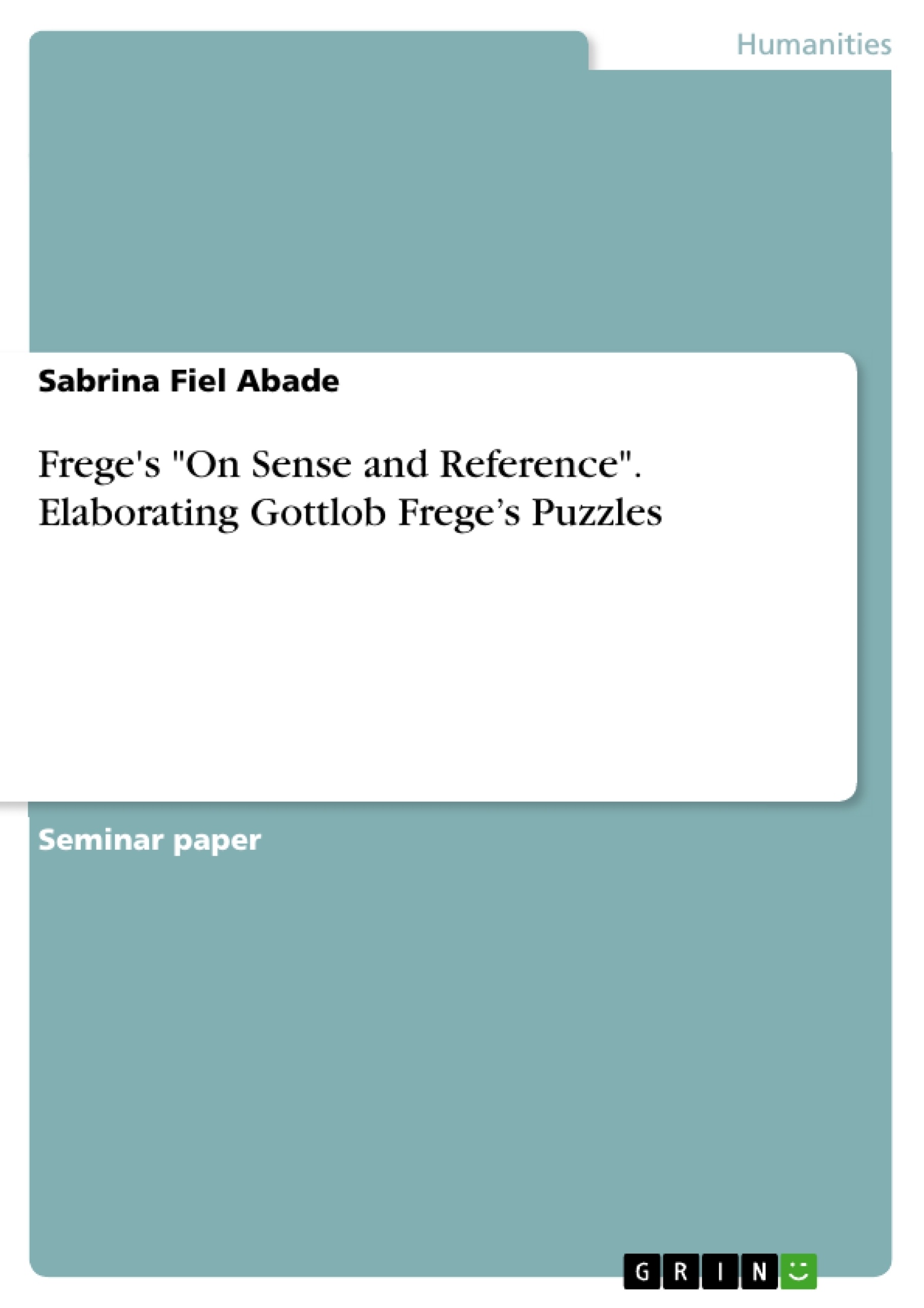While talking to someone, both may be speaking of the same thing, without realizing that they are doing so. When I am talking about the Morning Star, and someone else is talking about the Evening Star, are we both talking about the same thing? Or are we talking about two different things, as we are using different names for the thing we are talking about? To start an analysis on this topic, this paper will elaborate Frege’s Puzzle’s, which he introduces at the beginning of "On sense and reference".
He talks about two puzzles, one concerning identity statements, and the other, concerning propositional attitude reports. As he himself elaborates those puzzles, he will also try to find the solution to those puzzles. To understand his solution to the Puzzles, I will elaborate his solutions, giving various definitions, which are necessary to have a great understanding of what is being argued for. While his first puzzle is especially based on proper names, his second puzzle, will concern entire declarative sentences and forms of argumentation.
After having a clear understanding of what the problem with identity is, and how Frege claims to have solved it, we will see how one could oppose to Frege’s resolution to the puzzle. Analyzing multiple reproaches, would go beyond the scope of this paper. Therefore, we will only focus on a claim stated by Glezako Stravoula, saying that Frege started his argumentation wrong, by supposing that a=a can be known a priori.
Inhaltsverzeichnis (Table of Contents)
- Introduction
- Frege's Puzzles
- First Puzzle: Identity Statements
- Second puzzle: Propositional Attitude Reports
- Is Frege's solution to the puzzle of identity satisfactory?
- Epistemic difference
- Defense
- Conclusion
Zielsetzung und Themenschwerpunkte (Objectives and Key Themes)
This paper aims to analyze Frege's solution to the puzzles of identity and propositional attitude reports, as presented in his work "On Sense and Reference". Frege's puzzles challenge the conventional understanding of how language relates to objects and thought.
- The concept of sense and reference
- The nature of identity statements
- The role of intensional contexts in language
- The relationship between language, thought, and truth
Zusammenfassung der Kapitel (Chapter Summaries)
- Introduction: This chapter introduces the problem of identity and how it arises when discussing the same thing with different names or signs. Frege's two puzzles, concerning identity statements and propositional attitude reports, are presented as key points for analysis.
- Frege's Puzzles:
- First Puzzle: Identity Statements: This section explores the puzzle of identity, focusing on the cognitive value of statements like "a=a" and "a=b". Frege argues that while these statements can refer to the same object, their senses differ, leading to different cognitive value.
- Second Puzzle: Propositional Attitude Reports: This section expands on the puzzle of identity to include entire sentences and their relationship to thought and truth. Frege claims that in intensional contexts, like propositional attitude reports, words are used indirectly and their reference shifts to their usual sense.
- Is Frege's solution to the puzzle of identity satisfactory?: This chapter discusses criticisms of Frege's solution to the puzzle of identity. It focuses on the claim that Frege starts his argumentation by assuming a priori knowledge of "a=a", which may be problematic. This section also explores potential defenses of Frege's solution.
Schlüsselwörter (Keywords)
The core keywords of this work include sense and reference, identity statements, propositional attitude reports, intensional contexts, cognitive value, and Frege's philosophical framework.
Frequently Asked Questions
What is the difference between "Sense" and "Reference" in Frege's philosophy?
The reference (Bedeutung) is the object a sign names (e.g., the planet Venus). The sense (Sinn) is the "mode of presentation" or the way we think about that object (e.g., "Morning Star" vs. "Evening Star").
What is Frege's puzzle regarding identity statements?
The puzzle asks why "a=a" is uninformative (a priori), while "a=b" can provide new knowledge (a posteriori), even if both signs refer to the same object. Frege solves this by pointing to their different senses.
How does Frege explain propositional attitude reports?
In contexts like "John believes that...", words do not have their usual reference. Instead, their reference shifts to what is usually their sense, which explains why we cannot always substitute co-referring terms.
What is the criticism regarding a priori knowledge in Frege's work?
Critics like Glezako Stavroula argue that Frege wrongly assumes "a=a" is always known a priori. They challenge the starting point of his argumentation regarding the cognitive value of identity.
Why are proper names central to Frege's first puzzle?
Proper names (or definite descriptions) are the simplest signs that can share a reference but differ in sense, making them ideal for illustrating how identity statements can be informative.
- Citation du texte
- Sabrina Fiel Abade (Auteur), 2022, Frege's "On Sense and Reference". Elaborating Gottlob Frege’s Puzzles, Munich, GRIN Verlag, https://www.grin.com/document/1183093



